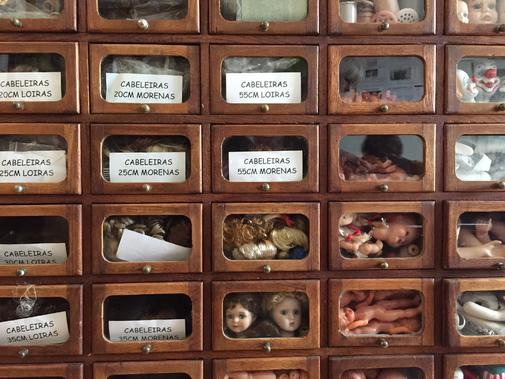On one side of the Praça da Figueira de Lisboa, halfway between the emblematic Largo do Rossio and the labyrinthine streets of the Mouraria, there is a small shop that has been dedicated to safeguarding the happiness of thousands of children for 190 years and solving the problems of many adults in trouble. This is the Hospital das Bonecas -or Hospital de las Muñecas-, a historical establishment where a team of specialized nurses use centuries-old techniques to heal dolls, stuffed animals, lead soldiers, and other injured toys.
In the festive season queues are formed at the entrance of the small shop, where grandmothers who want to restore dolls from their childhood accumulate to give them to the next generation of their family, or parents looking to repair a new toy that has suffered some mishap in an outburst of childhood enthusiasm.
The head of the medical team, Manuela Cutileiro, is accustomed to dealing with everyone, since the Hospital has been in her family since its founding in 1830. «In the early nineteenth century there was a market here and a great-great grandmother of mine, Don Carlotta, had a position of Medicinal herbs right on this plot, where he spent dead time making rag dolls stuffed with leaves. Little by little he also began to repair the dolls of the daughters of the market workers, until finally he went on to devote himself only to it ».
Almost two centuries later, the Hospital founded by Dona Carlotta is an institution in Portugal and a site revered in Lisbon , whose City Council has recognized it as a historic place worthy of special protection.
Obsessed with Spanish dolls
On the ground floor of the Cutileiro store and its team of six nurses receive customers, while on the top floor there is a museum full of donated pieces, most of them porcelain dolls from the beginning of the last century, among which those of Spanish origin.
«The Portuguese are obsessed with two Spanish things: candies and dolls. We usually say that in order for them to be good, they have to be Spanish , and today when a client wants to show off a doll that brings us to repair, he does so by emphasizing that it was made in Spain ». Cutileiro explains that Portugal never had its own industry in this regard, and that the few doll makers in Portuguese lands were exiled Spaniards who settled in Lisbon after the Civil War . "They were not enough, so it was normal to buy pieces imported from Alicante and Valencia." In addition to the iconic Mariquita Pérez -which, curiously, was devised by the Portuguese Leonor Coello, although they were always manufactured in Spain-, Cutileiro says that the stone cardboard dolls made in Las Palmas de Gran Canarias are also highly valued.
«Ships traveling between Lisbon and Brazil or our former African colonies made stops at the free port of Las Palmas and passengers used to buy dolls to bring daughters, nieces, girlfriends. They are not pieces that have the quality of a Mariquita Pérez, but they are collectible and have a symbolic value , and they are fascinating for restorers because they are made with newspaper sheets of the time; to 'cure' it is normal to run into headlines describing historical events ».
Courses and even precious objects to restore
The Hospital team has superior courses of restoration, and such is the reputation accumulated by the good work of the last 190 years that today also they receive precious objects of all kinds to restore.
«We repair many old religious images , and also porcelain figures, many of them from Asia. That is why the scientific and artistic training of our 'nurses' is so important ». Although the attention is undifferentiated, the profile of the clientele is of an amazing diversity. «In the same way that an old woman with a porcelain flamenco can be presented here with some splintered part , a child with a cracked teddy can appear. We welcome everyone with the same love ».
At a time when society is increasingly interested in recycling and opposed to consumerism, the Hospital boasts the two centuries it has been defending the principles claimed by activist Greta Thunberg. « The recycling of unique objects has always been a pillar of this institution, where in the end we do not just repair toys , but to preserve the emotions and memories and stories that people associate with dolls and stuffed animals that were given with love».
According to the criteria of The Trust Project
Know more- history
- Environment
Climate crisisThe director of Climate Change of the Government: "The street and science are asking us for ambition"
Controversy Javier Bardem apologizes for calling Almeida "stupid" and he wonders "what merits" he has to read a manifesto for the Climate
Environment Madrid doubles the number of trees planted in its parks

